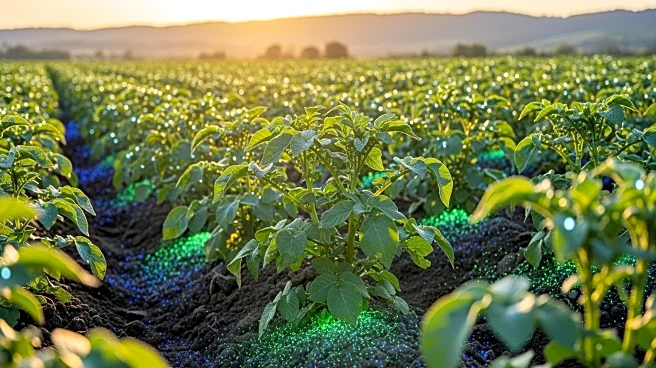What's Happening?
Recent research has demonstrated the benefits of silicon (Si) fertilizers in improving potato drought tolerance and reducing soil emissions of nitrous oxide (N2O) and methane (CH4). The study, conducted in Denmark, utilized automatic rain shelters to assess
the effects of Si fertilization on potato performance under varying drought conditions. Results indicated that Si fertilizers increased soil moisture retention, which is crucial for potato growth in water-limited environments. Additionally, Si fertilization enhanced plant phosphorus (P) nutrition and increased potato yields, although these increases were not statistically significant. The study also found that Si fertilizers reduced N2O emissions, a potent greenhouse gas, by enhancing soil porosity and aeration, which likely inhibited microbial denitrification processes. Furthermore, Si fertilizers increased soil CH4 uptake, contributing to reduced greenhouse gas emissions.
Why It's Important?
The findings highlight the potential of Si fertilizers to improve agricultural resilience to drought, particularly for potatoes, which are highly sensitive to water scarcity. By increasing soil moisture retention and nutrient availability, Si fertilizers can enhance crop yields and contribute to food security, especially in developing countries. The reduction in greenhouse gas emissions is significant for environmental sustainability, as N2O and CH4 have high global warming potentials. The study suggests that Si fertilizers could play a crucial role in climate-smart agricultural practices, promoting both yield improvement and environmental benefits.
What's Next?
Further research is needed to explore the long-term effects of Si fertilization across different soil types and climatic regions. Testing Si fertilizers on diverse crops and cropping systems will be essential to determine the broader applicability of these findings. Additionally, the potential use of diatomaceous earth as a sustainable source of Si fertilizer warrants investigation, as it could offer a cost-effective and environmentally friendly alternative to current Si fertilizers.
Beyond the Headlines
The study underscores the importance of sustainable agricultural practices in addressing climate change and food security challenges. By enhancing drought tolerance and reducing greenhouse gas emissions, Si fertilizers could contribute to more resilient agricultural systems. The use of diatomaceous earth as a Si source also presents an opportunity to repurpose industrial by-products, adding value to waste materials and promoting circular economy principles.














